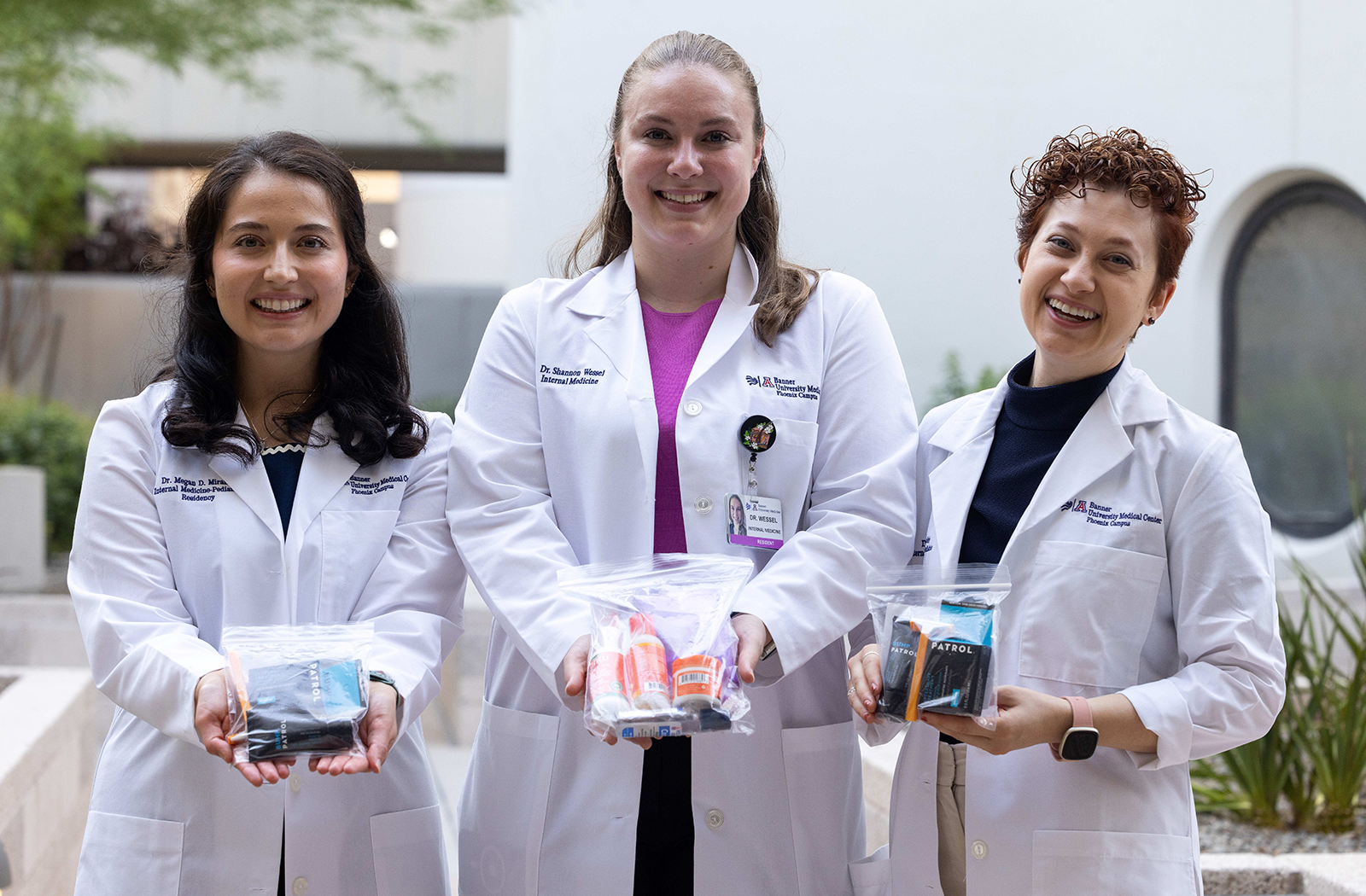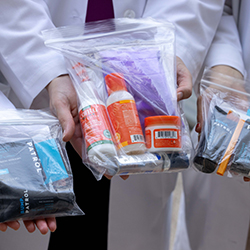
Inclusive Hair, Inclusive Care Project Seeks to Transform Bedside Care

Inclusive hair care in medicine is crucial for patient care, particularly for patients with textured or natural hair. Miriam Robin, MD, recent chief resident in the University of Arizona College of Medicine – Phoenix’s Internal Medicine and Pediatrics (Med-Peds) Residency program and current chief resident in the Internal Medicine Residency, saw an oversight in bedside care during her time in residency and sought to make a difference.
“Hair is a significant aspect of identity and cultural expression, especially for ethnic minorities,” Dr. Robin said. “But the current selection of hair and skin care products we carry don’t fully meet the unique needs of all patients, especially with those with natural hair, textured hair or locs.”
To meet this need, Dr. Robin and a team of residents and medical students developed the “Inclusive Hair, Inclusive Care” project, which aims to provide a more inclusive range of hair and skin care products.
Through this project, Dr. Robin earned an Accreditation Council for Graduate Medical Education (ACGME) Back to Bedside grant. The “Inclusive Hair, Inclusive Care” project was one of 23 open innovation projects that were awarded funding nationwide.
According to Dr. Robin, the project acknowledges that basic human dignity is as essential as evidence-based medicine. She said the first shower a patient takes in the hospital is critical in making them feel well again.
“We cannot expect some of our patients to anticipate an unanticipated visit and know to bring products from home,” Dr. Robin said. “Not all patients have family that can bring them their personal grooming supplies from home. This project is critical from a health equity standpoint in an area that is often overlooked.”

Dr. Robin said the current products carried at hospitals can cause hair breakage, and that the current razors can cause inflammation around the hair follicle when they are used on patients with curly facial hair.
To address this need, Dr. Robin, residents, and medical students built hair and skincare kits with QR codes that patients can scan and complete a survey about their satisfaction with the kits.
“Ultimately, we’re hoping to design the project in such a way that helps our patients feel more included and also help improve residency cultural competency by feeling more connected to their patients,” Dr. Robin said.
Through the “Inclusive Hair, Inclusive Care” pilot project, Banner Health will offer hair and beard kits containing satin headscarves, sulfate-free shampoo and conditioner, coconut curl cream, coconut oil, wide-toothed combs and large shower caps for patients with curly, coiled, dry or chemically processed hair.
Additionally, Banner Health will also carry beard care products — such as single-blade razors, soothing shaving cream and after shave — specifically for patients with curly and coiled hair.
This project stemmed from Dr. Robin’s clinical experiences at the height of the COVID-19 pandemic. In her first months after graduating medical school, Dr. Robin witnessed many patients die alone away from families.
“I went from a very happy medical student to someone that was considering leaving medicine,” Dr. Robin said.
“Understanding that aspect of burnout is so important as part of my journey because this project is about cultivating joy in medicine as a way of managing or preventing burnout.”
Dr. Robin credits Jodi Tate, MD, a clinical professor at the University of Iowa’s Department of Psychiatry, for sharing their pilot inclusive hair project and inspiring Dr. Robin to create this project.
Jinnie Xie a fourth-year medical student at the U of A College of Medicine – Phoenix and a member of Dr. Robin’s team for this project, previously worked with Dr. Robin during her pediatric rotation at Phoenix Children’s.
“I felt like Dr. Robin really cared about me as a medical student and was open to working with me,” Xie said. “That’s part of the reason I felt willing to help her with any other projects and continue working with her.”
For Dr. Robin, the future of bedside care will be in the recruitment of physicians with diverse life experiences. “Our patients look to our medical students, residents, fellows and attendings to advocate for them,” Dr. Robin said.
“One of the best ways we can advocate is to have shared life experience - a true understanding of what our patients go through. Projects like this are a step in the right direction.”
Dr. Robin leans toward her experience in working in a combined residency program — Med-Peds — to see what works in different systems in hospital settings.
“If we are able to find a successful model for projects like this, I’m optimistic that we will be able to see them succeed in multiple hospital systems.” Dr. Robin said. “I want our patients and our trainees to feel seen and know that there is space for them in medicine."
About the College
Founded in 2007, the University of Arizona College of Medicine – Phoenix inspires and trains exemplary physicians, scientists and leaders to advance its core missions in education, research, clinical care and service to communities across Arizona. The college’s strength lies in our collaborations and partnerships with clinical affiliates, community organizations and industry sponsors. With our primary affiliate, Banner Health, we are recognized as the premier academic medical center in Phoenix. As an anchor institution of the Phoenix Bioscience Core, the college is home to signature research programs in neurosciences, cardiopulmonary diseases, immunology, informatics and metabolism. These focus areas uniquely position us to drive biomedical research and bolster economic development in the region.
As an urban institution with strong roots in rural and tribal health, the college has graduated more than 1,000 physicians and matriculates 130 students each year. Greater than 60% of matriculating students are from Arizona and many continue training at our GME sponsored residency programs, ultimately pursuing local academic and community-based opportunities. While our traditional four-year program continues to thrive, we will launch our recently approved accelerated three-year medical student curriculum with exclusive focus on primary care. This program is designed to further enhance workforce retention needs across Arizona.
The college has embarked on our strategic plan for 2025 to 2030. Learn more.